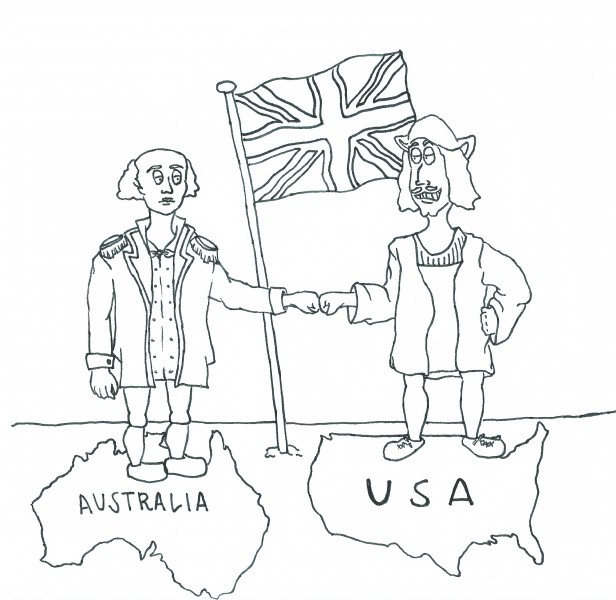Columbus, Australia Days must commemorate indigenous communities
Columbus Day and Australia Day have both been recognized as controversial holidays for some time now, as both commemorate the colonization of native land by Europeans. This colonization is directly associated with massacres of natives. Americans and Australians should rethink these holidays and understand that keeping them as national holidays is insensitive and unsympathetic to those whose ancestors were subjected to the atrocities brought about by settler-colonialism.
Columbus Day, celebrated on Oct. 12, marks the day Christopher Columbus arrived in the Americas. Following his arrival, European exploration and colonization flourished, resulting in the genocide of Native Americans.
These communities were subjected to violence, disease and enslavement. As a result of this treatment, natives lost almost all their land and many of their people, and this history has led to controversy concerning the legitimacy of Columbus Day.
This past August, Columbus Day was removed from the Los Angeles city calendar. It was replaced with Indigenous Peoples’ Day, a holiday celebrating those who inhabited the country before Columbus “discovered” it. Several other cities have also eliminated Columbus Day, but many of them have decided not to replace it with another holiday, as the Los Angeles did.
These moves toward eliminating Columbus Day are very important and should be celebrated, but they have not yet been adopted in enough cities to make a real difference in American culture. While it is commendable that many cities in Maine, California and other states have made this transition, Los Angeles is one of few major cities to do so.
Australia Day is essentially Australia’s version of the same holiday and reminds us that the celebration of the people who devastate natives’ societies is not limited to the U.S. Australia Day, observed on Jan. 26, commemorates the day the British first arrived in Australia. These settlers saw Australia as “terra nulius,” nobody’s land, as they did not recognize the aboriginal people who inhabited it as actual humans worthy of the land. As settlers continued expanding their territory and taking over more of the country, genocide resulted as the colonizers killed hundreds of thousands of the indigenous people who had been there long before the British arrived.
Many Australians, especially those related to the people who were massacred, taken away from their families and pushed to the most infertile land by the colonizers, refer to this holiday as “Invasion Day.” A number of aboriginals and other Australians are advocating to move Australia Day to another date. This way, it would celebrate the nation as a whole rather than inadvertently celebrating the invasion of Australia and destruction of indigenous groups as it does now.
There will always be people who will argue that history must be preserved and that these holidays should continue to be celebrated. What is much more important, however, is that we recognize the atrocities many people had to endure as a result of colonization.
With Columbus Day approaching next week, we should consider the history behind the holiday. Rather than celebrating the colonizers who committed appalling acts against native communities, we must remember indigenous people and everything they endured in trying to preserve their culture and their people.
This is an opinion and does not reflect the views of The Tulane Hullabaloo. Robin is a sophomore at Newcomb-Tulane College. She can be reached at [email protected].
Leave a Comment
Your donation will support the student journalists of Tulane University. Your contribution will allow us to purchase equipment and cover our annual website hosting costs.

















Don Honda • Oct 5, 2017 at 1:08 am
Apparently, “native americans” were not the first “indigenous” people here in North America. Evidence is mounting that they pushed out a previous population of European-centric origin:
http://www.smithsonianmag.com/smart-news/the-very-first-americans-may-have-had-european-roots-5517714/?no-ist
The Very First Americans May Have Had European Roots
Some early Americans came not from Asia, it seems, but by way of Europe
http://sciencenordic.com/dna-links-native-americans-europeans
Ancient DNA reveals that the ancestors of modern-day Native Americans had European roots. The discovery sheds new light on European prehistory and also solves old mysteries concerning the colonisation of America.
http://www.washingtonpost.com/national/health-science/radical-theory-of-first-americans-places-stone-age-europeans-in-delmarva-20000-years-ago/2012/02/28/gIQA4mriiR_story.html
Radical theory of first Americans places Stone Age Europeans in Delmarva 20,000 years ago
http://news.nationalgeographic.com/news/2003/09/0903_030903_bajaskull.html
Controversy erupted after skeletal remains were found in Kennewick, Washington, in 1996. This skeleton, estimated to be 9,000 years old, had a long cranium and narrow face—features typical of people from Europe, the Near East or India—rather than the wide cheekbones and rounder skull of an American Indian.
https://www.google.com/search?q=europeans+were+the+first+americans&ie=utf-8&oe=utf-8&aq=t&rls=org.mozilla:en-US:official&client=firefox-a&channel=sb